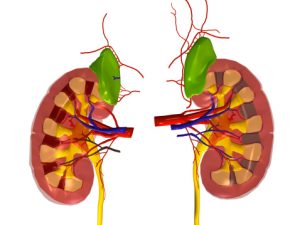 Sedentary behavior has been linked to numerous health consequences, and new research has found that avoiding such behavior can reduce your risk of chronic kidney disease. Researchers found that 80 minutes a day of sedentary behavior was associated with a 20 percent higher risk of chronic kidney disease. Findings from the study will be presented at ASN Kidney Week 2015 at San Diego Convention Center.
Sedentary behavior has been linked to numerous health consequences, and new research has found that avoiding such behavior can reduce your risk of chronic kidney disease. Researchers found that 80 minutes a day of sedentary behavior was associated with a 20 percent higher risk of chronic kidney disease. Findings from the study will be presented at ASN Kidney Week 2015 at San Diego Convention Center.
Sedentary behavior involves sitting, lying down, and essentially any activity that does not raise energy levels above normal. Sedentary behavior has been linked to an increased risk of diabetes, hypertension and obesity, but until now, the link between such behavior and chronic kidney disease was unknown.
Advertisement
Researchers examined the topic in 5,873 adults where intensity and length of physical activity was measured. Assuming the average person is awake for 16 hours a day, 80 minutes of sedentary behavior was associated with a 20 percent increased risk of chronic kidney disease.
Dr. Srini Beddhu, research lead, said, “Sedentary behavior, which is not mere lack of moderate/vigorous physical activity, is likely an independent risk factor for chronic kidney disease. It needs to be tested whether sedentary behavior affects the progression of chronic kidney disease, and thereby, increases the risk of end stage renal disease. Hence, interventions targeting sedentary behavior to slow the progression of chronic kidney disease need to be conducted.”
Exercise lowers chronic kidney disease risk: Study
 While sedentary behavior increases the risk of chronic kidney disease, research has found that exercise can lower the risk. A study presented at last year’s ASN Kidney Week 2014 in Pennsylvania found that exercise lowers the risk of chronic kidney disease.
While sedentary behavior increases the risk of chronic kidney disease, research has found that exercise can lower the risk. A study presented at last year’s ASN Kidney Week 2014 in Pennsylvania found that exercise lowers the risk of chronic kidney disease.
The researchers evaluated the effects of 12 months of exercise training on kidney function and heart disease risk in patients with chronic kidney disease (CKD). Twenty patients were either assigned to rehabilitation training, which involved exercise, or standard care. Eighteen patients completed it by the end of the study.
After the 12 months of either program the researchers found those in the exercise group had a slower rate of kidney decline along with improved cardiovascular function. Dr. Sharlene Greenwood, research lead, said, “Exercise-based rehabilitation has the potential to be a kidney-protective therapy for patients with progressive stages 3-4 CKD, and larger studies are planned. Exercise, besides protecting the kidneys, also will improve fitness, general health, and quality of life and has the potential to reduce cardiovascular risk, a major cause of mortality and morbidity in patients with CKD.”
In additional research conducted by Dr. Francesca Mallamaci, they examined the effectiveness of low-intensity, easy-to-implement home exercises on physical performance of dialysis patients. A total of 151 patients were instructed to follow a metronome while walking and 146 patients continued with their regular physical activity.
After a six-month period the patients who followed the metronome improved their results in a six-minute walking test, while the control group remained the same. The metronome group also improved during a sit-to-stand test, while the control group once again remained the same. Investigators concluded, “A personalized, low-intensity home exercise program improves physical performance in dialysis patients. The simplicity and adaptability of the program make it suitable to the needs of a high-risk population such as the dialysis population.”
Manage your other important CKD risk factor: Diet
 Aside from avoiding sedentary behaviors and becoming more active – whether low- or high-intensity exercising – diet plays a large role in chronic kidney disease as well. A healthy diet can help lower bad cholesterol and maintain healthy blood pressure levels – alternative areas of risk for chronic kidney disease.
Aside from avoiding sedentary behaviors and becoming more active – whether low- or high-intensity exercising – diet plays a large role in chronic kidney disease as well. A healthy diet can help lower bad cholesterol and maintain healthy blood pressure levels – alternative areas of risk for chronic kidney disease.
A balanced diet consisting of plenty of fruits and vegetables, along with whole grains, can help you better prevent chronic kidney disease. Furthermore, limiting your salt intake is also good practice to help reduce your risk.
You will also want to lower your intake of foods that contain saturated fat by avoiding the following:
- Meat pies
- Sausage and fatty meat
- Butter
- Cheese
- Lard
- Cream
- Cakes and biscuits
- Foods that contain coconut oil and palm oil
On the other hand, it’s good practice to increase your intake of unsaturated fat, including:
- Oily fish
- Avocados
- Nuts and seeds
- Sunflower oil
- Rapeseed oil
- Olive oil
Other key CKD risk factors to avoid
Other risk factors, which can further develop chronic kidney disease, that you should be mindful of are:
Smoking – it increases your risk of cardiovascular disease and can make pre-existing kidney problems much worse.
Alcohol – it raises blood pressure and cholesterol, two other factors of kidney disease.
Painkillers – taking too many painkillers is harmful to the kidneys.
Tips for reducing sedentary behavior
Living an active life as you age may seem more like a challenge as you experience more aches and pains and may even have a disability, but it’s not impossible to curb sedentary behaviors. Here are some tips to decrease sedentary behaviors, no matter the challenges you may face.
 Use a pedometer for motivation and monitor how many steps you are taking each day – the recommended amount is 10,000.
Use a pedometer for motivation and monitor how many steps you are taking each day – the recommended amount is 10,000.- Get a pet as they can help keep you active.
- Try cleaning the house when the TV is on, so you can catch your show and be active at the same time.
- Increase intensity when cleaning – adding music can keep you more upbeat.
- Spend time with family and preferably get outside.
- Get more involved in the community and volunteer your time.
- Join a club or fitness center for guidance.
- Try physical therapy.
- When on the phone, pace around the house.
- Use stairs as much as possible, instead of the elevator.
By adding more physical activity into your day you won’t only improve kidney function, but you can boost overall health as well.
Related Reading:
Early chronic kidney disease (CKD) diagnosis possible with new blood markers
Early chronic kidney disease (CKD) diagnosis is now possible with new blood markers. Roughly 10 percent of the population is affected by chronic kidney disease, which can contribute to kidney failure, heart disease and premature death. Continue reading…
Advertisement
Unlike kidney stones, which are solid stone-like forms, kidney cysts are fluid-filled pouches. Although a kidney cyst is generally non-cancerous and harmless, some of them can be associated with kidney disorders which can lead to complications. Continue reading…
Sources:
http://www.eurekalert.org/pub_releases/2015-10/ason-pws101915.php
http://www.nhs.uk/Conditions/Kidney-disease-chronic/Pages/Prevention.aspx
http://health.gov/paguidelines/blog/post/decreasing-sedentary-behavior-and-physical-inactivity-by-moving-more-and-sitting-less.aspx
